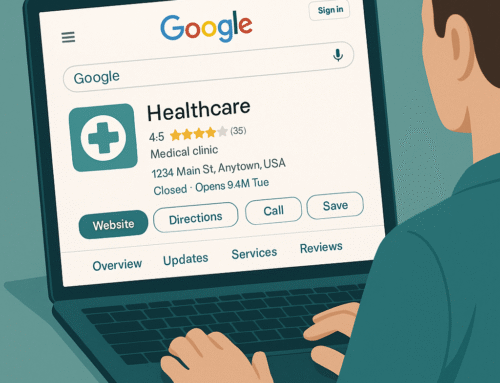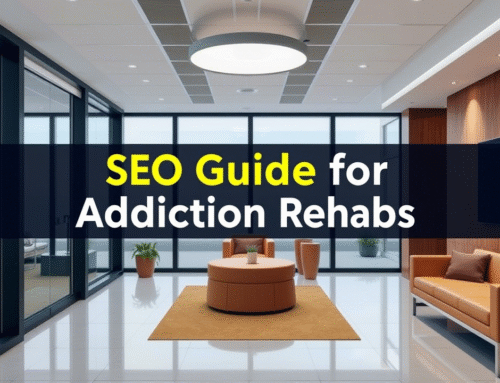Today, Healthcare SEO has become a necessity for every medical practice that is seeking to capture the attention of and retain its clients. Moving forward to 2025, SEO has become a complex field with new trends to consider for the healthcare industry. In this article, we look at various crucial factors involved in Healthcare SEO along with useful tips to become successful in the competitive healthcare industry.
Why Healthcare SEO Matters in 2025
Over the years, the healthcare industry has experienced a rise in technology and many patients use the internet to seek medical services. Helpful content updates, AI-based search results, and voice search optimization are the SEO trends that will dominate the majority of medical websites in 2025. Some of the main reasons that motivate healthcare facility owners to invest in Healthcare SEO include:
- Higher Competition Levels – An increasing number of practices are adopting SEO means to obtain clients.
- Google updates – New SEO strategies have to cater to the changes Google integrates into its algorithms.
- Patient Trust & Credibility – In addition, patients give higher credibility to the top-ranked healthcare websites.
- Local SEO – Patients seek healthcare providers in their locality more so in the present era.
Top Healthcare SEO Strategies for 2025
To excel in Healthcare SEO, it’s essential to focus on several core components:
1. Local SEO Optimization
Local SEO plays an important role in medical practices because many patients are looking for healthcare services within their geographical location. Optimizing for local search involves
- Google Business Profile (GBP): It is crucial to create and optimize your GBP listing and add appropriate details such as business information, business opening hours, and business products/services offered. This ensures that you get good ranking in the local search and Google Maps.
- Local Keywords: Incorporate location-specific keywords into your website content, such as “addiction treatment in Orlando, Florida” or “mental health center near me.” This practice helps the client put its services in sync with local search queries.
- Patient Endorsements: It is good to ensure that patients who have been attended to and happy leave positive comments on your GMB profile and others. On the other hand, positive feedback improves the reputation of your website and affects the site’s ranking in the search engines.
2. Mobile-Friendly Website Design
It is therefore crucial that the website be mobile-friendly, given that most users find healthcare information through mobile devices. A mobile-friendly design ensures:
- Responsive Design: A web design ensures that the website layout suits all the screens and displays with equal ease.
- Easy Download of Frequently Accessed Web Pages: Mobile users desire faster access to information and this is likely to be attained if the e-learning CMS is loaded with the frequently accessed web pages. Images may slow down loading speed and it is therefore useful to integrate optimized images and fewer codes as much as possible.
- Increased Conversions: Menu items in pop-up windows and clear and visible buttons help the users attain their goal without any confusion.
3. High-Quality, Informative Content
Many individuals believe content to be the backbone of Healthcare SEO, as the ten years of its operation would testify. It makes the targeted audience consider your practice as a credible source of information in the medical field when the content is useful, accurate, and entertaining. Strategies include:
- Write Blog Posts: These are to be published from time to time depending on the issues that relate to certain illnesses or other concerns for this year. This is the management of certain illnesses, the available preventive measures, and the general health tips that can be of benefit to the general public. It not only helps inform the target audience but also enhances the website’s ranking on search engines.
- FAQ Section: List down questions that patients may ask and their answers to those questions. This makes it easier for the user and coincides with the basic voice search question.
- Multimedia Content: Use videos, infographics, and podcasts for the best results, as different customers might prefer different forms of content consumption.
4. Voice Search Optimization
The use of voice-activated assistants has altered the mode of interaction between the users and the search engine. Optimizing for voice search involves
- Conversational Keywords: These keywords should be in terms of questions, for instance, symptoms of addiction. or “Alcohol addiction treatment.”
- Voice Helpers: Organize the information and ideas you offer to customers to answer the queries in as few words as possible, and this increases your chances of using the featured snippets that most voice assistants use.
5. Technical SEO and Site Performance
As we know, the technical aspects of this website play a crucial role in the SEO rankings of your site. Key considerations include:
- Site Speed: Demand that your website load fast enough to avoid a high bounce rate among visitors.
- Use of Secure Website (HTTPS): When planning for the website, always endeavor to acquire SSL certificates, as this serves as a major factor in creating trust and search engine optimization for the health facility and patient data.
- Schema Markup: It is recommended to incorporate the schema into a site to help the search results to have a better understanding of the content of any site and return the best results.
6. Compliance with E-E-A-T Guidelines
Google has identified four key principles for the YMYL topic—Experience, Expertise, Authoritativeness, and Trust (E-E-A-T). To align with these guidelines:
- Author Credentials: Depicts authors’ competency to create content to impress upon the audience.
- Originality: Ensure that the content does not closely resemble the blogs discussed in the class.
- Continuity: Make information as relevant as possible to ensure that people have up-to-date data.
7. Patient Reviews & Online Reputation Management
It is important to note that reviews affect the local SEO ranking greatly. Encourage:
- Genuine patient testimonials on Google, Healthgrades, and Yelp.
- Various ways and means through which reputations can be managed with specific focuses on negative comments.
- Recommendation to send auto-generated emails to the patients who are fully satisfied with the services received.

8. Leveraging Social Media Platforms
Social media helps one to access the patients and make them reach out to your practice instantly. Effective use involves:
- Scheduled Updates: Interests share health tips, practices, and patient feedback to ensure that clients are up to date.
- Implement Feedback: Engage with the patient and reply to his/her inquiries or suggestions and contribute to the feeling of belongingness and credibility.
- Marketing Strategies: Use of advertisement on social media platforms in order to help in reaching out to more clients and also to advertise specific service segments.
9. Monitoring and Analytics
Such a process makes it possible for the metrics to be checked constantly and the SEO strategies adjusted and fine-tuned. Key practices include:
- Performance Measurements: This includes tracking the level of website traffic and bounce rates, as well as conversion rates that will determine the success of the specific SEO strategies.
- Search Engine Rankings: Track the ranking of the specific words you have set as your objectives and how they perform on the search engines to guide content development.
- Patient Feedback: Ensure the evaluation of patient comments and feedback in order to understand the prospects that still need to be fulfilled.
10. Adapting to Emerging Technologies
Conversely, keeping track of the technological developments will ensure that your practice is a perfect fit in the market. Considerations include:
- The Use of Artificial Intelligence (AI): The implementation of the technology in patient experience and prognosis analysis.
- Augmented Reality (AR): Explore AR applications for patient education and virtual tours of your facility.
- Wearable Devices/Technology Support: Offer content and services relating to the purpose of health-monitoring wearables.
Conclusion

With the steady progression towards 2025, healthcare SEO without a doubt remains a relevant and influential tool in medical practice promotion. Thus, by paying particular attention to local SEO, a mobile-first perspective, high-quality content, and technology, healthcare organizations will be able to develop a successful strategy in the digital environment, become more trustworthy to the patients, and gain competitiveness.
If you need expert SEO services for your medical practice, start implementing these strategies today with ALLGOOD MARKETING to stay ahead of the competition. Get a FREE QUOTE now.
















